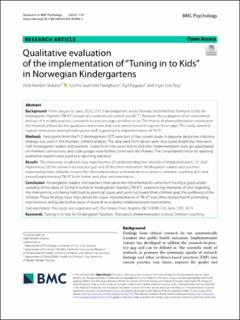| dc.contributor.author | Teig, Inger Lise | |
| dc.contributor.author | Skåland, Vilde Randen | |
| dc.contributor.author | Nygaard, Egil | |
| dc.contributor.author | Havighurst, Sophie Seychelle | |
| dc.date.accessioned | 2023-04-24T11:19:59Z | |
| dc.date.available | 2023-04-24T11:19:59Z | |
| dc.date.created | 2023-04-10T16:46:23Z | |
| dc.date.issued | 2023 | |
| dc.identifier.issn | 2050-7283 | |
| dc.identifier.uri | https://hdl.handle.net/11250/3064492 | |
| dc.description.abstract | Background
From January to June 2020, 22 FUS kindergartens across Norway implemented Tuning in to Kids for Kindergarten Teachers (TIK-KT) as part of a randomized control trial (RCT). Between the evaluation of an intervention and use of it in daily practice, a research-to-practice gap can often occur. The theory of planned behavior constituted the theoretical basis for the qualitative interviews that were administered to explore these gaps. This study aimed to explore motivation among kindergarten staff regarding the implementation of TIK-KT.
Methods
Participants from the FUS kindergartens RCT were part of the current study. A stepwise deductive inductive strategy was used in the thematic content analysis. The data were from eleven semi-structured telephone interviews with kindergarten leaders and teachers. Codes from interviews before and after implementation were grouped based on thematic connections, and code groups were further combined into themes. The Consolidated criteria for reporting qualitative research were used as a reporting standard.
Results
The interviews resulted in four main themes: (1) understanding the rationale of implementation, (2) "aha"-experiences, (3) the research-to-practice gap and (4) the main motivation. Kindergarten leaders and teachers expressed positive attitudes toward the intervention ideas and motivation to practice emotion coaching skills and toward implementing TIK-KT both before and after implementation.
Conclusion
Kindergarten leaders’ and teachers’ motivation for implementation came from having a good understanding of the ideas of Tuning in to Kids for Kindergarten Teachers (TIK-KT), experiencing moments of “aha” regarding the intervention, not being held back by practical issues, and working toward their ultimate goal, the wellbeing of the children. These findings have implications for future implementation of TIK-KT and other mental health-promoting interventions and guide further areas of research to examine implementation mechanisms. | en_US |
| dc.language.iso | eng | en_US |
| dc.publisher | BMC | en_US |
| dc.rights | Navngivelse 4.0 Internasjonal | * |
| dc.rights.uri | http://creativecommons.org/licenses/by/4.0/deed.no | * |
| dc.title | Qualitative evaluation of the implementation of “Tuning in to Kids” in Norwegian Kindergartens | en_US |
| dc.type | Journal article | en_US |
| dc.type | Peer reviewed | en_US |
| dc.description.version | publishedVersion | en_US |
| dc.rights.holder | Copyright 2023 The Author(s) | en_US |
| dc.source.articlenumber | 87 | en_US |
| cristin.ispublished | true | |
| cristin.fulltext | original | |
| cristin.qualitycode | 1 | |
| dc.identifier.doi | https://doi.org/10.1186/s40359-023-01088-4 | |
| dc.identifier.cristin | 2139792 | |
| dc.source.journal | BMC Psychology | en_US |
| dc.identifier.citation | BMC Psychology. 2023, 11, 87. | en_US |
| dc.source.volume | 11 | en_US |

